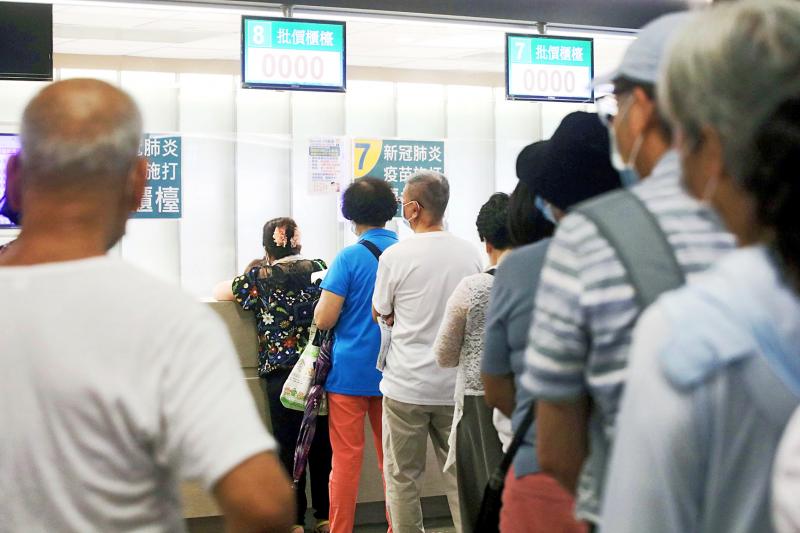The central government alone is in charge of importing and approving the use of COVID-19 vaccines, Minister of Health and Welfare Chen Shih-chung (陳時中) yesterday told a media briefing in Taipei, responding to calls for the involvement of local governments in Taiwan’s vaccine drive.
Taipei Mayor Ko Wen-je (柯文哲) had said that Chen, who heads the Central Epidemic Command Center (CECC), concealed that local government officials could import vaccines doses through pharmaceutical companies.
Chen said that those companies must apply for licenses to import drugs with the Food and Drug Administration, which can allow imports of drugs pending approval.

Photo: Cheng I-Hwa, Bloomberg
“Drug imports must be based on the Pharmaceutical Affairs Act [藥事法], which allows emergency import if the drug has yet to secure relevant certificates. Local governments are not pharmaceutical companies, and they cannot import drugs,” he said.
Vaccine procurements are a national security issue, Chen said, adding that the import, production and use of vaccines is regulated by the central government.
This was to avoid confusion and chaos, he said, adding that countries around the world have similar rules in place.
As of yesterday, 129,669 people in Taiwan have received at least one dose of a COVID-19 vaccine produced by AstraZeneca, CECC data showed.
On Tuesday, 16,180 people received the jab, a new record for vaccination on a single day, it showed.
Centers for Disease Control (CDC) Deputy Director-General Chuang Jen-hsiang (莊人祥), who is CECC spokesperson, said that two women, who are in their 40s, had severe side effects after being vaccinated.
One of them reported a swollen left cheek and pain in the left upper arm, while the other experienced visual impairment, Chuang said.
“So far, there has yet to be studies on the correlation of the AstraZeneca vaccine and visual impairments,” Chuang said, adding that the center would examine the reports.
Meanwhile, Chen also dismissed the possibility of launching universal testing, despite a surge of locally transmitted cases.
“To contain the spread of the virus, contact tracing and testing should be conducted quickly. Those who are potentially infected might be in the incubation period or already infectious, and we want to quickly stop the virus from spreading,” he said. “Universal testing without specific purpose would only weaken our ability to contain the outbreak.”
In related news, National Security Bureau (NSB) special forces personnel responsible for protecting President Tsai Ing-wen (蔡英文) and Vice President William Lai (賴清德) have started receiving vaccines, a source in the military said on condition of anonymity, adding that all personnel would be fully vaccinated by the end of this month.
NSB Director-General Chen Ming-tong (陳明通) would receive a shot soon, the source said.
Additional reporting by CNA

Conflict with Taiwan could leave China with “massive economic disruption, catastrophic military losses, significant social unrest, and devastating sanctions,” a US think tank said in a report released on Monday. The German Marshall Fund released a report titled If China Attacks Taiwan: The Consequences for China of “Minor Conflict” and “Major War” Scenarios. The report details the “massive” economic, military, social and international costs to China in the event of a minor conflict or major war with Taiwan, estimating that the Chinese People’s Liberation Army (PLA) could sustain losses of more than half of its active-duty ground forces, including 100,000 troops. Understanding Chinese

The Ministry of Foreign Affairs (MOFA) yesterday said it is closely monitoring developments in Venezuela, and would continue to cooperate with democratic allies and work together for regional and global security, stability, and prosperity. The remarks came after the US on Saturday launched a series of airstrikes in Venezuela and kidnapped Venezuelan President Nicolas Maduro, who was later flown to New York along with his wife. The pair face US charges related to drug trafficking and alleged cooperation with gangs designated as terrorist organizations. Maduro has denied the allegations. The ministry said that it is closely monitoring the political and economic situation

UNRELENTING: China attempted cyberattacks on Taiwan’s critical infrastructure 2.63 million times per day last year, up from 1.23 million in 2023, the NSB said China’s cyberarmy has long engaged in cyberattacks against Taiwan’s critical infrastructure, employing diverse and evolving tactics, the National Security Bureau (NSB) said yesterday, adding that cyberattacks on critical energy infrastructure last year increased 10-fold compared with the previous year. The NSB yesterday released a report titled Analysis on China’s Cyber Threats to Taiwan’s Critical Infrastructure in 2025, outlining the number of cyberattacks, major tactics and hacker groups. Taiwan’s national intelligence community identified a large number of cybersecurity incidents last year, the bureau said in a statement. China’s cyberarmy last year launched an average of 2.63 million intrusion attempts per day targeting Taiwan’s critical

‘SLICING METHOD’: In the event of a blockade, the China Coast Guard would intercept Taiwanese ships while its navy would seek to deter foreign intervention China’s military drills around Taiwan this week signaled potential strategies to cut the nation off from energy supplies and foreign military assistance, a US think tank report said. The Chinese People’s Liberation Army (PLA) conducted what it called “Justice Mission 2025” exercises from Monday to Tuesday in five maritime zones and airspace around Taiwan, calling them a warning to “Taiwanese independence” forces. In a report released on Wednesday, the Institute for the Study of War said the exercises effectively simulated blocking shipping routes to major port cities, including Kaohsiung, Keelung and Hualien. Taiwan would be highly vulnerable under such a blockade, because it